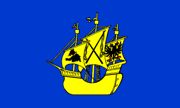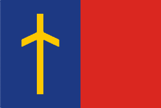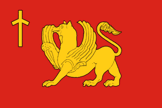![[safety pennant]](../images/v/vxt-d1351.gif)
Safety Afloat Pennant, USN (seaflags)
Please note that this term has a wider use than is detailed above, and the Editors recommend that a heraldic dictionary be consulted if further details are required.
![[saber example]](../images/v/vxt-d2702.gif)
![[saber example]](../images/v/vxt-d4054.gif)
![[saber example]](../images/v/vxt-d4507.gif)
Flag of Cyców, Poland;
Flag of Kowala, Poland;
Flag of Illinetsi District, Ukraine
Please note that in some Central and East European usage the term is used to describe a sword with a curved single-edged blade but with a straightforward cross guard as illustrated above – but see ‘scimitar’.



Flags of the Red Cross, Red Crescent and
Red Crystal
Please note that on 8 December 2005 the International Committee of the Red Cross adopted a Protocol (Protocol III) authorizing a red crystal (diamond shape) as an additional non-religious and politically neutral symbol, however, please also note that the flags of the Red Cross and of its associated organizations are at the same time international flags, safe conduct, flags of protection and Geneva Convention flags.
2) See ‘beach flag’ and ‘storm warning flag’ (also ‘airfield safety flag’ and ‘red flag 1)’).



Health Flag; Japan;
Safety Flag for General Use, Japan;
Health and Safety Flag, Japan
2) In vexillology and in modern heraldry the terms for a wind-powered, sea-going vessel regardless of type – but see the notes below (also ‘galleon’).



Flag of Wittmund, Germany;
Flag of Kostrena, Croatia;
Flag of Dumyat (Governorate), Egypt
Notes
a) The term "sailing vessel" (as given in the alternative heading above) can include
those which are designed for inshore/leisure activities such as sailing dinghies or yachts, however;
2) to individually list the many types these or other sailing vessels is
(properly speaking) beyond the remit of this dictionary, nonetheless, please see ‘caravel’
with its following note, ‘cog’ and ‘nef’.

The Arms of Velas, Portugal showing a caravel
Please note that this term is a translation of the German Schiffermast, and that use of such masts seems to be restricted to associations of bargemen or similar.



Battle Ensign of the Coast Guard,
Georgia;
Naval Ensign of Russia;
National Flag of Scotland
Please note that whilst the term St George's Cross generally refers only to a red cross on a white field, the Cross of St Andrew, due to a tradition that the saint was crucified on a diagonal cross, has come to be regarded by many as a saltire of any colour or metal on a field of any colour or metal. Although this is considered inaccurate in English heraldic or vexillological usage, it is common in countries and languages where a term equivalent to “saltire” does not exist.
![[St. Anthony's cross]](../images/v/vxt-d1913.gif)
![[St. Anthony's cross]](../images/v/vxt-d1913a.gif)
Flag and Arms of Sint Anthonis, The Netherlands
![[St. Catherine's wheel]](../images/v/vxt-d2967.gif)
![[St. Catherine's wheel]](../images/v/vxt-d5026.gif)
![[St. Catherine's wheel]](../images/v/vxt-d2966.gif)
Flag of Ryglice, Poland;
Flag of Peredo, Portugal;
Flag of St Catherine’s College Cambridge, UK
Please note that a "pectoral cross" is one of the badges of office worn by a bishop.![[St. Cuthbert's cross]](../images/v/vxt-d3157.gif)
![[St. Cuthbert's cross]](../images/v/vxt-d3157a.gif)
![[St. Cuthbert's cross]](../images/v/vxt-d3158.gif)
Flag of Durham County, UK;
Arms of Newcastle University, UK (official website);
Flag of Kirkcudbrightshire, UK
![[Blanes Spain]](../images/v/vxt-d1906.gif)
Flag of Blanes, Spain
![[Russian naval ensign]](../images/v/vxt-d1178.gif)
Flag of the Honourable East India Company c. 1650, England
Notes![[England]](../images/v/vxt-d674.gif)
![[Sutherland Shire, Australia]](../images/v/vxt-d4006.gif)
![[Genoa, Italy]](../images/v/vxt-d674a.gif)
National Flag of England;
Flag of Sutherland Shire, Australia;
Flag of Genoa, Italy
a) Any cross of St George whose arms are of equal length is also a Greek cross (see also 'Greek cross').
b) In Balkan and Central European usage a white cross on red is also sometimes referred to as the
Cross of St George.
![[Donji Miholjac, Croatia]](../images/v/vxt-d4853.gif)
Flag of Donji Miholjac, Croatia
Notes![[British White Ensign]](../images/v/vxt-d620.gif)
![[British White Ensign]](../images/v/vxt-d4935.gif)
![[British White Ensign]](../images/v/vxt-d620b.gif)
White Ensign, England 1702–1707;
White Ensign for use in home waters 1707 – c1740;
White Ensign, UK 1707–1801
a) White ensigns bearing a Cross of St George overall were introduced in 1702 to avoid any possible confusion between the those of the white division of the English fleet, and the plain white ensigns of the French.
b) They were at first at restricted to use outside home waters, however, the version with a plain fly had disappeared by 1744.
![[Order of St. James]](../images/v/vxt-d1907.gif)
Cross of the Order of Santiago


Flag of
Sighnaghi, Georgia; Flag of
Kaspi, Georgia
Please note that the flag of the Georgian Orthodox Church may (occasionally) be charged with a cross of this type, however, when it is hoisted from a conventional flagpole the downward sloping arms will point towards the fly.

Flag of the Georgian Orthodox Church
Please note that this saltire has no known links to the saint, but when adopted for the British Union Flag was a symbol of the knightly Order of St Patrick (see also union jack).

![[colour example]](../images/v/vxt-d555g.gif)
